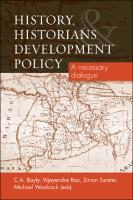History, historians and development policy
A necessary dialogue
Contributor(s)
Rao, Vijayendra (editor)
Bayly, C. A. (editor)
Collection
Knowledge Unlatched (KU)Number
104230Language
EnglishAbstract
The substantive and methodological contributions of professional historians to development policy debates was marginal, whether because of the dominance of economists or the inability of historians to contribute. There are broadly three ways in which history matters for development policy. These include insistence on the methodological principles of respect for context, process and difference; history is a resource of critical and reflective self-awareness about the nature of the discipline of development itself; and history brings a particular kind of perspective to development problems . After establishing the key issues, this book explores the broad theme of the institutional origins of economic development, focusing on the cases of nineteenth-century India and Africa. It demonstrates that scholarship on the origins of industrialisation in England in the late eighteenth century suggests a gestation reaching back to a period during which a series of social institutional innovations were pioneered and extended to most citizens of England. The book examines a paradox in China where an emphasis on human welfare characterized the rule of the eighteenth-century Qing dynasty, and has been demonstrated in modern-day China's emphasis on health and education. It provides a discussion on the history of the relationship between ideology and policy in public health, sanitation in India's modern history and the poor health of Native Americans. The book unpacks the origins of public education, with a focus on the emergency of mass literacy in Victorian England and excavates the processes by which colonial education was indigenized throughout South-East Asia.
Keywords
History; General; Social Science; Developing & Emerging CountriesISBN
9781526151612Publisher
Manchester University PressPublisher website
https://manchesteruniversitypress.co.uk/Publication date and place
2011Grantor
Imprint
Manchester University PressClassification
History
Development studies


 Download
Download